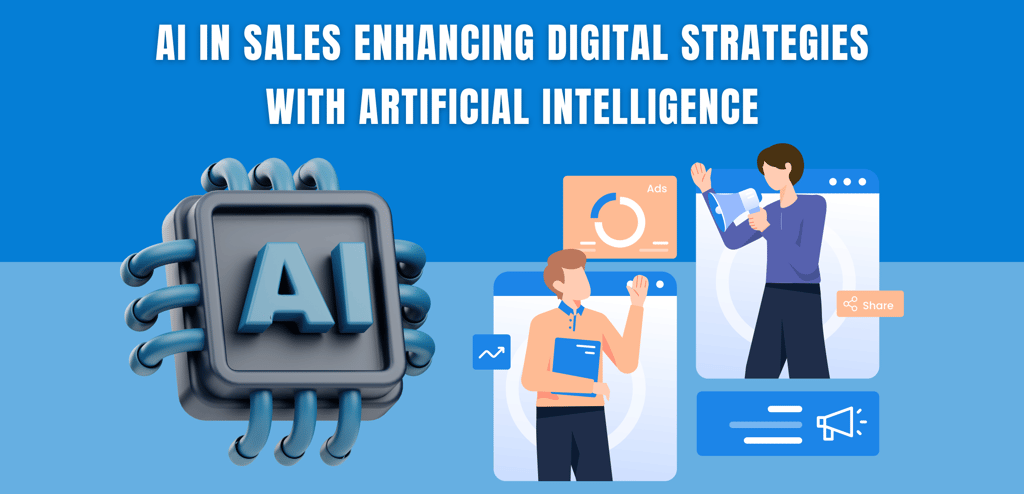
AI in Sales Enhancing Digital Strategies with Artificial Intelligence
By AZ Konnect Team
9/27/20243 min read
In today’s fast-paced digital landscape, the integration of Artificial Intelligence (AI) into sales strategies is transforming how businesses engage with customers, optimize their processes, and ultimately drive revenue. AI in sales is no longer just a futuristic concept; it’s a powerful tool that companies are leveraging to gain a competitive edge. This blog post explores how AI is enhancing digital sales strategies, from lead generation and customer segmentation to personalized marketing and predictive analytics.
1. Automating Lead Generation and Qualification
One of the most significant ways AI is transforming sales is through automating lead generation and qualification processes. AI-driven tools can analyze vast amounts of data to identify potential leads, assess their likelihood to convert, and prioritize them for follow-up.
Data Analysis: AI algorithms sift through large datasets to identify patterns and trends, helping sales teams target the right prospects at the right time.
Lead Scoring: AI can automatically score leads based on their behavior, demographics, and engagement, allowing sales teams to focus on the most promising opportunities.
Chatbots: AI-powered chatbots engage with visitors on websites, answering queries and capturing leads 24/7, ensuring no potential customer slips through the cracks.
2. Enhancing Customer Segmentation
AI enables businesses to segment their customer base more accurately than ever before. By analyzing data points such as purchase history, online behavior, and social media interactions, AI can create highly targeted customer segments.
Personalized Marketing: With AI-driven segmentation, marketing messages can be tailored to specific customer groups, increasing the relevance and effectiveness of campaigns.
Behavioral Insights: AI can predict customer behavior based on past interactions, allowing sales teams to anticipate needs and tailor their approach accordingly.
Dynamic Segmentation: AI continuously analyzes customer data, allowing for real-time adjustments in segmentation as new information becomes available.
3. Personalizing the Sales Experience
Personalization is key to modern sales success, and AI is making it easier to deliver highly personalized experiences at scale. AI analyzes customer data to create customized content, product recommendations, and sales pitches that resonate with individual customers.
Tailored Recommendations: AI can suggest products or services based on a customer’s previous purchases or browsing history, increasing the likelihood of a sale.
Customized Communication: Sales teams can use AI to personalize email campaigns, social media interactions, and even phone calls, making customers feel valued and understood.
Predictive Personalization: AI anticipates customer needs before they even express them, allowing businesses to proactively offer solutions that meet those needs.
4. Improving Sales Forecasting with Predictive Analytics
Accurate sales forecasting is crucial for effective business planning. AI enhances forecasting accuracy by analyzing historical data, market trends, and external factors to predict future sales outcomes.
Historical Data Analysis: AI examines past sales data to identify patterns and trends that can inform future sales strategies.
Real-Time Adjustments: AI allows businesses to adjust forecasts in real-time as new data becomes available, ensuring that predictions remain accurate and relevant.
Scenario Planning: AI can simulate different scenarios based on various factors, helping businesses prepare for potential changes in the market.
5. Streamlining Sales Operations
AI is also streamlining sales operations by automating routine tasks and improving overall efficiency. Sales teams can spend less time on administrative work and more time engaging with customers.
CRM Automation: AI-powered CRM systems automatically update and manage customer data, reducing the need for manual data entry and minimizing errors.
Task Automation: AI can automate repetitive tasks such as scheduling meetings, sending follow-up emails, and generating reports, freeing up time for sales professionals to focus on selling.
Workflow Optimization: AI analyzes workflows to identify inefficiencies and suggests improvements, helping sales teams operate more effectively.
6. Enhancing Customer Relationship Management
AI plays a critical role in enhancing Customer Relationship Management (CRM) by providing deeper insights into customer needs, preferences, and behaviors.
360-Degree View: AI integrates data from various sources to provide a comprehensive view of each customer, helping sales teams tailor their approach.
Predictive Maintenance: AI can predict when a customer might need support or service, allowing businesses to proactively address issues before they escalate.
Customer Lifetime Value (CLV): AI helps identify high-value customers by analyzing factors such as purchase history, engagement, and loyalty, enabling businesses to focus on retaining these customers.
Conclusion
The integration of AI into sales strategies is revolutionizing the way businesses operate in the digital age. By automating processes, enhancing customer segmentation, personalizing experiences, and improving forecasting, AI is helping sales teams become more efficient and effective. As AI technology continues to evolve, its role in sales will only become more critical, offering new opportunities for businesses to engage with customers, optimize their strategies, and drive growth. Embracing AI in sales is no longer an option—it’s a necessity for businesses looking to stay competitive in an increasingly digital world.
Subscribe To Our Newsletter




